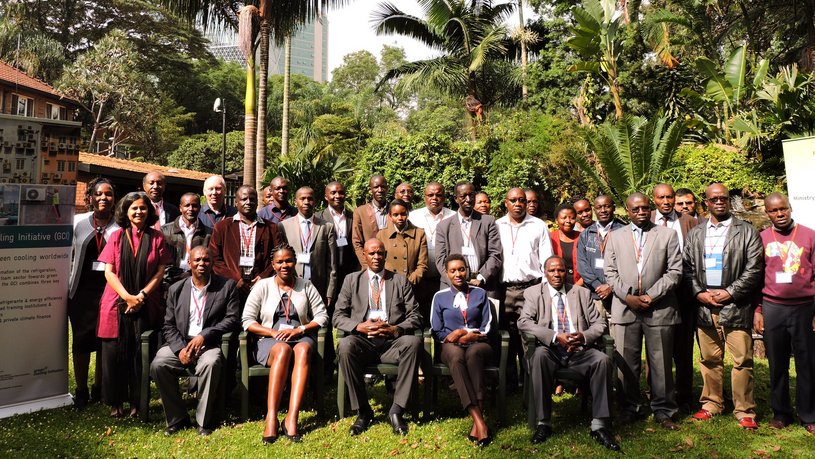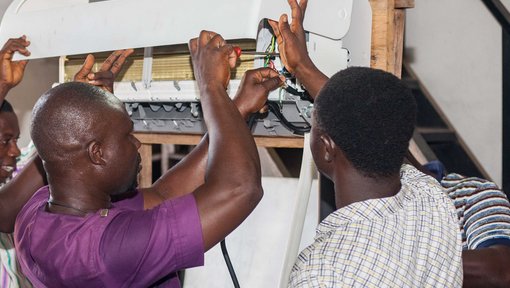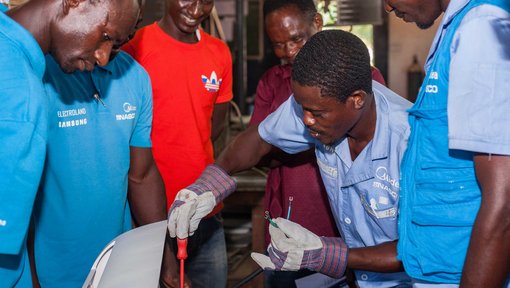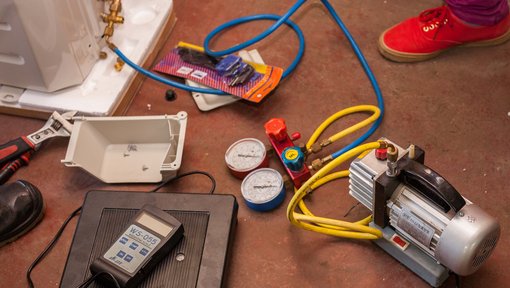Kenya, Ghana and the Seychelles want to bring the refrigeration and air conditioning sector onto the big stage of the political arena. The Green Cooling Initiative is supporting them in their efforts.
Even though 2020 was a challenging year - as it was for all of us - we are proud of what we achieved with the Green Cooling Initiative. During the project runtime we have worked with our partner countries Kenya, Ghana and Seychelles on the sustainable transformation of their RAC sectors, in establishing standards and suitable policy frameworks, and in training technicians. This year, however, we have had to adjust our workflows.
Being ‘digital by default’ was no longer an option, it became a duty. From virtual workshops and webinars to collaborating online with our partners and contributors, this year we had many opportunities to expand our digital skills and put them to beneficial use. For this reason, the relaunch of our website http://www.green-cooling-initiative.org also came at exactly the right time. Have you been able to discover all the new features yet? We especially recommend our interactive infographic with the different cooling sectors as well as our new publication database. We would also like to draw your attention to the following topics that have kept us busy this year:
Fit for Green Cooling: Qualifying, Certifying and Registering the RAC workforce of the future
Training on the use of natural refrigerants can help reducing direct and indirect emisisons, improve technicians' health, their working conditions and secure their incomes. For this reason, GIZ Proklima developed ‘Fit for Green Cooling’, a scheme where RAC technicians can be qualified, certified and registered. It was developed according to international standards but can be adapted to national contexts and integrated in country-specific structures. The training concept is currently being finalized and the adaptation to national circumstances and the inclusion in the national training curriculum is being prepared in all three GCI countries (Ghana, Kenya and the Seychelles).
NDCs and Kenya
In Kenya, a stakeholder workshop for the refrigeration and air conditioning sector was conducted in March 2020. The objective of the workshop was to provide a consultative forum for the RAC sector stakeholders in order for them to deliberate and develop recommendations and a roadmap on how to come up with a comprehensive and credible QCR scheme in Kenya. A curriculum review to include hydrocarbon training was suggested. Currently, discussions are underway with all the relevant training institutions on how to include the handling of hydrocarbons in the respective curricula using the training manuals prepared by GIZ.
Integration of the RAC sector into the NDCs
Supporting the inclusion of the RAC sector into the NDC updates of Ghana, Kenya, the Seychelles and on request also Namibia was a priority in 2020. As COP26 was rescheduled to November 2021, the timelines for the NDC submissions in the various countries also shifted. In Ghana and the Seychelles, the process to include the RAC sector into the NDCs is still on-going. In Kenya, the RAC sector was included in the technical report, which serves as basis for the NDC (for details, see below).
“The integration of the RAC sector into the NDCs is an important step for the countries, as it puts the topic on the national agenda and underlines the importance of acting accordingly. It is a clear signal that countries are serious about reducing emissions in the RAC sector,” adds Ines Josten, who joined the Green Cooling Initiative this year as a project manager. “It is great to see the dedication and commitment of our partners to this important issue”.
In focus (I): Kenya raises its ambitions
"For the Kenyan GCI team, our highlight for 2020 is the inclusion of RAC in the Kenyan NDC, which means that the benefits of reducing hydrofluorocarbons associated with the Kigali Amendments will be considered in climate change discussions," say Juliet Cheruto and Josephine Mutero. Both have been working for the Green Cooling Initiative in Kenya for several years.
Mitigation Potential
If the Kenyan RAC sector is sustainably transformed, GHG emissions could be reduced by about 1.41 Mt CO2-eq in 2030.
Kenyas ambitions
In the current update, GHG emissions from the RAC sector have been incorporated into the NDC update technical report. The Green Cooling Initiative in Kenya was part of the extensive stakeholder analysis in the NDC process presenting potential mitigation from Kenya’s RAC sector. The contributions described in this submission are built upon Kenya’s first NDC, the National Adaptation Plan (2015-2030), new policies and national plans, and reflect subsequent work as captured in Kenya’s Second National Climate Change Action Plan (2018-2022) and the Third National Inventory Report.
GCI developed a National Cooling Strategy (NCS) and presented it to the National Ozone Unit in the Ministry of Environment and Forestry. The NCS actions were basis for consideration in the inclusion of the RAC sector into the NDC. The actions presented in the NSC have the potential to reduce GHG emissions by about 1.41 Mt CO2eq in 2030. Due to growing population and the expected climate change towards warmer temperatures, the demand for cooling is steadily rising. GHG emissions from Kenya's RAC sector increased from 3.23 MtCO2e to 3.66 MtCO2eq from 2010 to 2015. Based on current trends and a projected hotter climate in Kenya, the GHG emissions from the RAC sector are projected to be about 9.5 MtCO2eq by 2030.
In focus (II): Publication of the Greenhouse Gas Inventory Report for the RAC sector in the Seychelles
A similar situation can be observed in the Seychelles. Over the last few years there has been constant growth in the Seychelles’ RAC industry. The growing population, wealth and temperatures have led to an increased demand for air conditioning and refrigeration solutions. A key driver for the cooling demand is the tourism sector of the Seychelles, providing air-conditioned rooms and storage space for refrigerated goods.
Seychelles Inventory Report
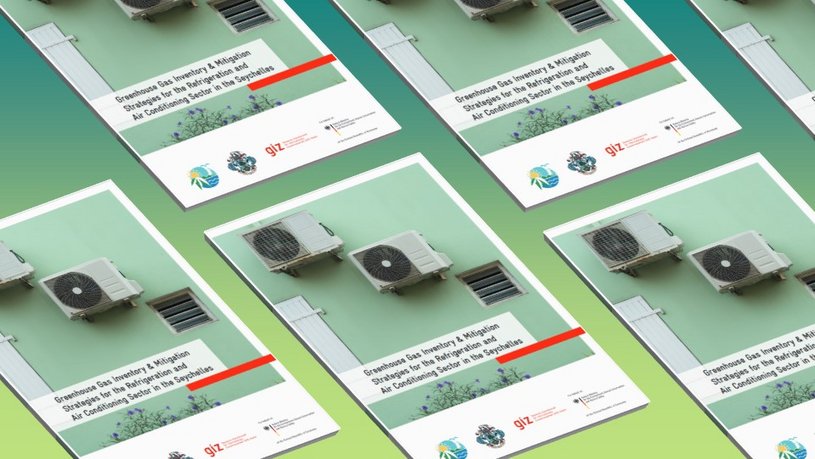
The report's findings suggest that the RAC sector was responsible for the emission of 0.32 Mt CO2eq in 2017. This means that the RAC sector’s share in overall energy-related emissions lies at approximately 33% of Seychelles’ overall indicated GHG emissions of 0.968 Mt CO2eq in 2017.
Following the current trend and the predicted 2–2.5 °C global temperature rise until 2100 (IPCC, 2014), the use of air conditioners and refrigeration will increase. The resulting annual emissions in the Seychelles’ RAC sector are expected to rise to around 0.48 Mt CO2eq in the year 2050.
Under ambitious mitigation measures with the transition to low-GWP refrigerants and energy efficient RAC appliances, emissions could be reduced compared to the BAU scenario. The adoption of best available technology (BAT) and the design of targeted policy measures could keep projected GHG emissions below 0.35 Mt CO2eq in 2050. Further mitigation could be achieved through shifting the energy supply of RAC appliances from fossil fuels to renewable energy sources.
The full report can be found here.
In focus (III): Handover of monitoring devices in Ghana
Cooling equipment based on low-GWP natural refrigerants requires special training due to their higher flammability. The qualification of local technicians is therefore also an aspect that the Green Cooling Initiative actively promotes in its partner countries. In 2019, GCI successfully handed over 380 R290 AC units to the implementing partner in Ghana, the Environmental Protection Agency (EPA), who in turn handed them over to two firms (Electroland and Flexispace), and - in collaboration with Midea - gave a training to 15 technicians to be qualified to safely handle R290 in climate-friendly ACs.
Ghana Gallery
Ghana activities
This year, GCI provided 10 monitoring devices to EPA for monitoring the energy consumption and CO2 emissions from the R290 ACs. It is said that the climate-friendly ACs are 25% more energy efficient and can save more than GHC 120 per month. The 380 devices will also avoid more than 10t of GHG emissions during their life span. “Monitoring the ACs to receive exact numbers on energy consumption and CO2 emissions will give us steady data, also considering country specific conditions. This will help us to verify the assumed saving potentials of R290 ACs,” adds Verena Maas, project manager at the Green Cooling Initiative.
Thank you!
All GCI team members would like to thank the partners for their continued efforts in the fight against climate change and look forward to all future activities!

